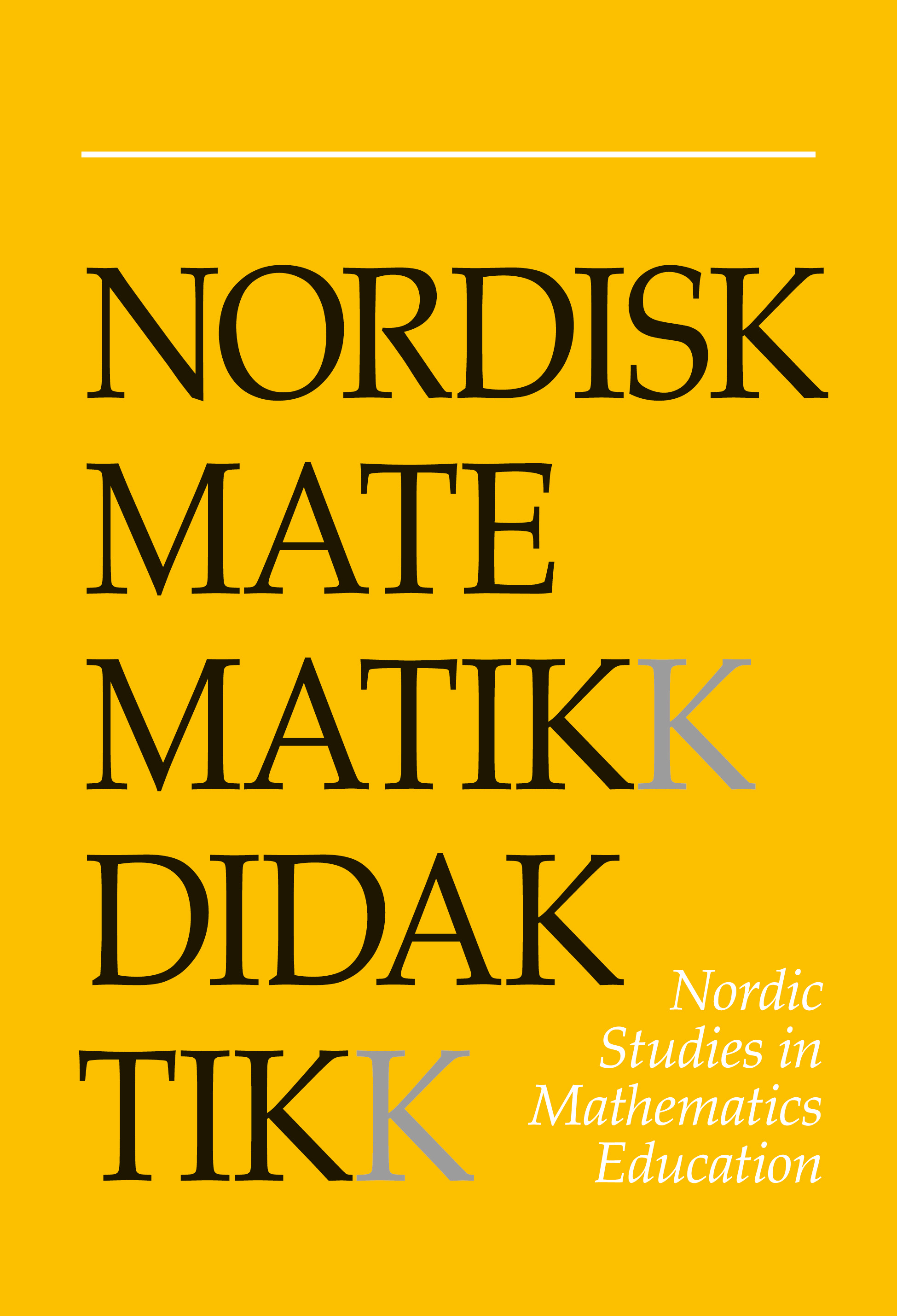Formative assessment in Swedish mathematics classroom practice
DOI:
https://doi.org/10.7146/nomad.v22i1.148754Abstract
Research shows that substantial learning gains are possible through the use of formative assessment. However, little is known about Swedish mathematics teachers’ use of formative assessment, and thus about the possible value of professional development programmes. This study uses teacher interviews and classroom observations to examine the classroom practice of 38 randomly selected primary and secondary school teachers in a mid-sized Swedish municipality. A framework of formative assessment comprising one big idea and five Key strategies structured the analysis. The study identifies characteristics of current formative assessment practices. The results show that the teachers do use a variety of formative assessment activities, but also that there is much room for development towards a more effective formative classroom practice.
References
Bennett, R. (2011). Formative assessment: a critical review. Assessment in Education: Principles, Policy & Practice, 18 (1), 5-25. https://doi.org/10.1080/0969594X.2010.513678
Björklund Boistrup, L. (2010). Assessment discourses in mathematics classrooms: a multimodal social semiotic study (Doctoral dissertation). Department of Mathematics and Science Education, Stockholm University. Retrieved from http://su.diva-portal.org/smash/record.jsf?pid=diva2:355024
Black, P. & Wiliam, D. (1998). Assessment and classroom learning. Assessment in Education: Principles, Policy & Practice, 5 (1), 7-74. https://doi.org/10.1080/0969595980050102
Black, P. & Wiliam, D. (2009). Developing the theory of formative assessment. Educational Assessment, Evaluation and Accountability, 21 (1), 5-31. https://doi.org/10.1007/s11092-008-9068-5
Carless, D. (2005). Prospects for the implementation of assessment for learning. Assessment in Education: Principles Policy and Practice, 12 (1), 39-54. https://doi.org/10.1080/0969594042000333904
Dignath, C. & Büttner, G. (2008). Components of fostering self-regulated learning among students. A meta-analysis on intervention studies at primary and secondary school level. Metacognition and Learning, 3 (3), 231-264. https://doi.org/10.1007/s11409-008-9029-x
Gielen, S., Peeters, E., Dochy, F., Onghena, P. & Struyven, K. (2010). Improving the effectiveness of peer feedback for learning. Learning and Instruction, 20, 304-315. https://doi.org/10.1016/j.learninstruc.2009.08.007
Hattie, J. (2009). Visible learning: a synthesis of over 800 meta-analyses relating to achievement. London: Routledge.
Hattie, J. & Timperley, H. (2007). The power of feedback. Review of Educational Research, 77 (1), 81-112. https://doi.org/10.3102/003465430298487
Kvale, S. (2009). InterViews: learning the craft of qualitative research interviewing (2nd ed.). Los Angeles: Sage Publications.
Leahy, S. & Wiliam, D. (2012). From teachers to schools: scaling up professional development for formative assessment. In J. Gardner (Ed.), Assessment and learning (pp. 49-71). London: Sage Publications. https://doi.org/10.4135/9781446250808.n4
National Mathematics Advisory Panel. (2008). Chapter 6: Report of the Task Group on Instructional Practices. Retrieved from http://www.ed.gov/about/bdscomm/list/mathpanel/report/instructional-practices.pdf
Organisation for economic co-operation and development [OECD]. (2005). Formative assessment: improving learning in secondary classrooms. Paris: OECD.
Olovsson, T. G. (2014). The assessment process in a Swedish year five classroom: "Reach page 52!". International Journal of Primary, Elementary and Early Years Education, 1-13. https://doi.org/10.1080/03004279.2014.899382
Panadero, E. & Jönsson, A. (2013). The use of scoring rubrics for formative assessment purposes revisited: a review. Educational Research Review, 9, 129- 144. https://doi.org/10.1016/j.edurev.2013.01.002
Rohrbeck, C. A., Ginsburg-Block, M. D., Fantuzzo, J. W. & Miller, T. R. (2003). Peer-assisted learning interventions with elementary school studies: a meta- analytic review. Journal of Educational Psychology, 95 (2), 240-257. https://doi.org/10.1037/0022-0663.95.2.240
Schneider, M. C. & Randel, B. (2010). Research on characteristics of effective professional development programs for enhancing educators' skills in formative assessment. In H. L. Andrade & G. J. Cizek (Eds.), Handbook of formative assessment (pp. 251-276). Abingdon: Routledge.
Shute, V. J. (2008). Focus on formative feedback. Review of Educational Research, 78 (1), 153-189. https://doi.org/10.3102/0034654307313795
Smith, K. (2011). Professional development of teachers - a prerequisite for afl to be successfully implemented in the classroom. Studies in Educational Evaluation, 37 (1), 55-61. https://doi.org/10.1016/j.stueduc.2011.03.005
Stiggins, R. J. (2002). Assessment crisis: the absence of assessment FOR learning. Phi Delta Kappan, 83 (10), 758-765. https://doi.org/10.1177/003172170208301010
Swaffield, S. (2011). Getting to the heart of authentic assessment for learning. Assessment in Education: Principles, Policy & Practice, 18 (4), 433-449. https://doi.org/10.1080/0969594X.2011.582838
Tierney, R. D. (2006). Changing practices: influences on classroom assessment. Assessment in Education: Principles, Policy and Practice, 13 (3), 239-264. https://doi.org/10.1080/09695940601035387
Wiliam, D. & Thompson, M. (2008). Integrating assessment with learning: what will it take to make it work? In C. A. Dwyer (Ed.), The future of assessment: shaping teaching and learning (pp. 53-82). Mahwah: Lawrence Erlbaum. https://doi.org/10.4324/9781315086545-3
Yeh, S. (2009). Class size reduction or rapid formative assessment? A comparison of cost-effectiveness. Educational Research Review, 4 (1), 7-15. https://doi.org/10.1016/j.edurev.2008.09.001
Zimmerman, B. (2002). Becoming a self-regulated learner: an overview. Theory Into Practice, 41 (2), 64-70. https://doi.org/10.1207/s15430421tip4102_2
Downloads
Published
How to Cite
Issue
Section
License

This work is licensed under a Creative Commons Attribution-NonCommercial-ShareAlike 4.0 International License.



